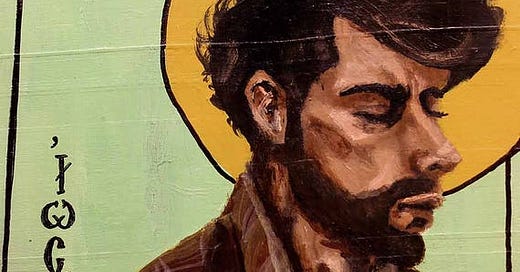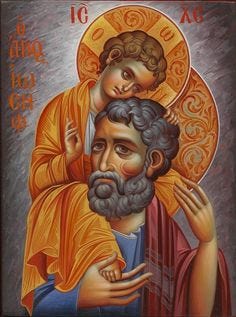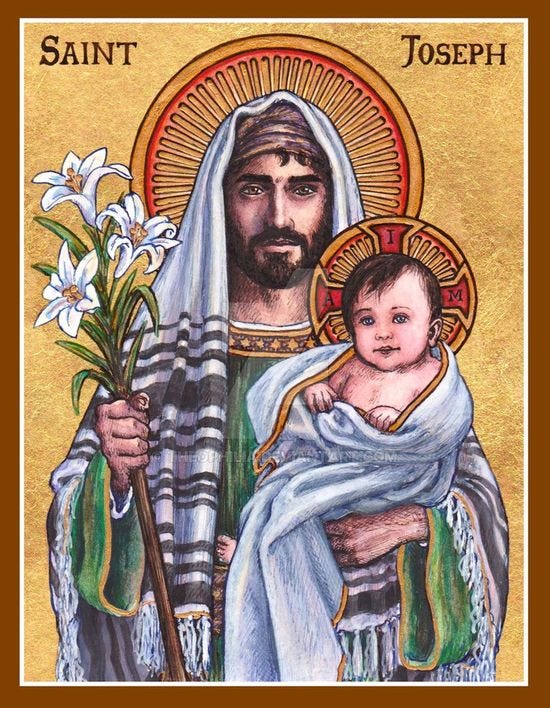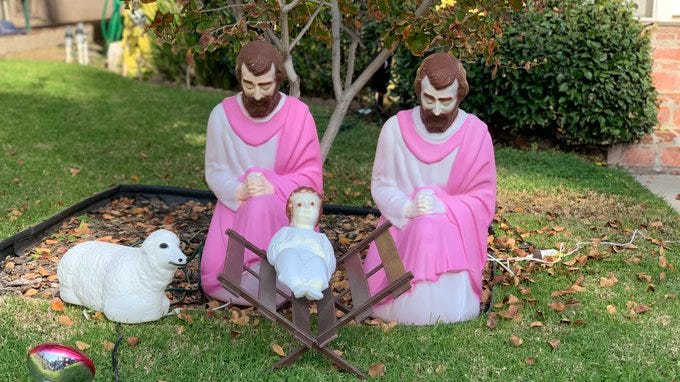I'm sure he must have been surprised
At where this road had taken him
Cause never in a million lives
Would he have dreamed of Bethlehem.
-A Strange Way To Save The World
Advent Day 23: Joseph the Just
Joseph is one of the key figures in Jesus’s life, yet he occupies the gospels in silence. He doesn’t speak with an angel. He doesn’t sing his own version of Mary’s Magnificat or Zechariah’s Benedictus. He doesn’t rush off to share with anyone news of the fearful gift that’s been thrust upon him. He just fulfills his duties with honor and love then exits history without uttering a word.
Joseph, in many ways, is what we might call the strong, silent type. We’ve all known one of those—a dad, grandfather, neighbor. A man who keeps calm and carries on while remaining largely an enigma, in life and death. US Poet Laureate Robert Hayden wrote about just such a man—his father—in Those Winter Sundays:
Sundays too my father got up early and put his clothes on in the blueblack cold, then with cracked hands that ached from labor in the weekday weather made banked fires blaze. No one ever thanked him. I’d wake and hear the cold splintering, breaking. When the rooms were warm, he’d call, and slowly I would rise and dress, fearing the chronic angers of that house, speaking indifferently to him, who had driven out the cold and polished my good shoes as well. What did I know, what did I know of love’s austere and lonely offices?
I see Joseph in this poem…a man who banks the fire, warms the room and polishes the shoes, occupying the edges of the story in silence. A man to whom history has spoken indifferently. No great religious prayers devoted to him. Very little art. Few, if any lines given him in Christmas pageants. And not a single classic Christmas carol that even mentions him (though a few modern songwriters have started to fill in the gap).
But just because Joseph is silent, it doesn’t mean he doesn’t have something to say.
The gospels tell us that after Mary’s visit from the angel Gabriel, she traveled to her cousin Elizabeth’s home where she remained for three months. This means that by the time she returned to Nazareth, she would have started to show. She could no longer delay facing Joseph.
Now, if you’ve ever had to break difficult news to someone—news that, depending how it is received, could have a profound impact on your life—then you have a tiny window into the fear Mary must have felt when facing Joseph. In ancient Israel, the punishment for adultery was stoning (Leviticus 20:10). So, Joseph held Mary’s life in his hands.
The Bible doesn’t record Joseph’s immediate reaction to Mary’s pregnant-by-the-holy-spirit story, but we can imagine the feelings: skepticism, anger, confusion, betrayal. Maybe he spoke those feelings aloud. If he did, they didn’t make it into the narrative. Maybe he greeted the news with silence—a careful laying down of his chisel, jaw set as he turned away from his betrothed, struggling to maintain control of his feelings.
What seems clear is that he didn’t blow his top. Instead, despite the turmoil he must have felt, he resolves to protect Mary’s reputation—and life—by breaking up with her quietly. This important detail tells us that, even though Jesus is not yet born, we’ve already entered his upside-down kingdom where mercy and love are the only law that truly matters.
Before taking any action, however, Joseph does what sensible people in all times and places have done when faced with a difficult decision: he takes a nap. And as he sleeps, he receives a mystical vision of a messenger from God:
Joseph, do not be afraid to wed Mary and bring her into your home and family as your wife. She did not sneak off and sleep with someone else—rather, she conceived the baby she now carries through the miraculous wonderworking of the Holy Spirit. She will have a son, and you will name him Jesus, which means “the Lord saves,” because this Jesus is the person who will save all his people…
Trusting, or at least calmed by, this nocturnal vision, Joseph accepts the task of fathering the unborn child, with all the danger and difficulty that entails. This is his first step on the mystical path of surrender that is parenthood.
Sometime later, Caesar Augustus calls a census for the purposes of taxation. Because Joseph is from the house of David, he and Mary must travel to Bethlehem to be counted. The journey would’ve been exhausting, dangerous, and cold with the onset of winter. They must have arrived in Bethlehem just as Mary went into labor, because they found shelter in the first place they could—what early Christian tradition says was a cave. Here, Mary gave birth to her firstborn, a son.
The gospel says Mary ponders all that followed that night in her heart. But Joseph, too, surely pondered. Whether they put words to it or not, fathers also fear, worry, hope, rejoice, love and treasure things in their hearts. Watching over the manger, perhaps Joseph thought back to the picture of the life he once thought he’d have with Mary. Very likely this did not include a suspect pregnancy, gossip among neighbors, and a difficult trek down to Bethlehem. As shepherds peeked in to look at the babe, perhaps Joseph had a passing thought of the road not taken. In that moment, if given the chance to do it all again, would he have made the same decision? Would he have stuck around?
I feel certain he still would have said yes.
It’s Joseph’s yes—echoing and complementing Mary’s own yes—that makes his part in the story remarkable. He had the choice to be there, or not. Nothing in scripture says he was forced to stick by Mary and Jesus. The angel told him only to not be afraid. So Joseph made the choice to not be overcome by the fear he surely felt. He chose to do the right thing, even though it was the hard thing, as countless dads and father-figures have done throughout the ages.
Christmas pageants and holiday readings always finish with the night Jesus is born. Peace on earth is a message that stirs the soul. We like to end there, the same way we like to end romantic comedies with a wedding. It allows us to rest in the fantasy of happily-ever-after. But while weddings, births and proclamations of peace are significant, they last for only a moment. It’s our actual messy lives following those things that make up the greater part of our stories. Joy and sorrow, hope and hopelessness, love and loss.
For Joseph and his brood, hard days followed that one holy night, that fleeting reprieve that was the first Christmas: King Herod’s death threat, the slaughter of the innocents, the flight to Egypt and exile there. Then, later, the journey home.
Through it all, Joseph sticks by his family. He reads the map, builds the fire, drives out the cold—a reminder that the most powerful witness to the gospel is not the preaching or teaching of it, but the living of it. No words required.
Practice
For today’s practice, think of a Joseph-figure from your life. This can be, but doesn’t have to be, your own father. It can also be an uncle, an older friend, teacher, coach, etc.—anyone who has nurtured you and helped you grow. Spend time today journaling or praying gratitude for the fact that you have had this person in your life.
Holidays at Life In The City
All in-person gatherings listed below happen at 205 East Monroe St. in Austin, Texas.
Dec. 8, 11:15 am: LITC’s original musical, Make Room In Your Heart. Dec. 21, 6:00 pm: Blue Christmas, an intimate service for the longest night. Dec. 23, 6:00 pm: Our annual Christmas Eve-Eve service. Dec. 29, 11:15 am: Welcome 2025 with a fun, casual service that includes coffee, cookies, conversation and resolution-making.
Contemplation In The City
Life In The City’s contemplative community meets regularly to practice sacred traditions like Lectio Divina and Centering Prayer. If you’re in Austin, consider joining us. Upcoming in-person gatherings are Jan. 14, Feb. 4, Mar. 4, Apr. 8, May 6. We meet at 205 East Monroe Street in Austin. Doors open at 6pm for coffee and conversation, service from 7-8pm. You might also find meaning in our monthly newsletter in which we wrestle with how to live a spiritually engaged life in the modern world. Read more here.
Ready For More?
Read the Introduction to the 2022 edition, to find out how my experience of September 11, 2001 became my gateway to Advent.
Find more mystics, saints and prophets in our Archive.
Feedback
Catch a typo? Have suggestions for mystics, saints and prophets for a future year? Leave feedback in the Comments below or email Greg Durham at greg@litcaustin.org.










